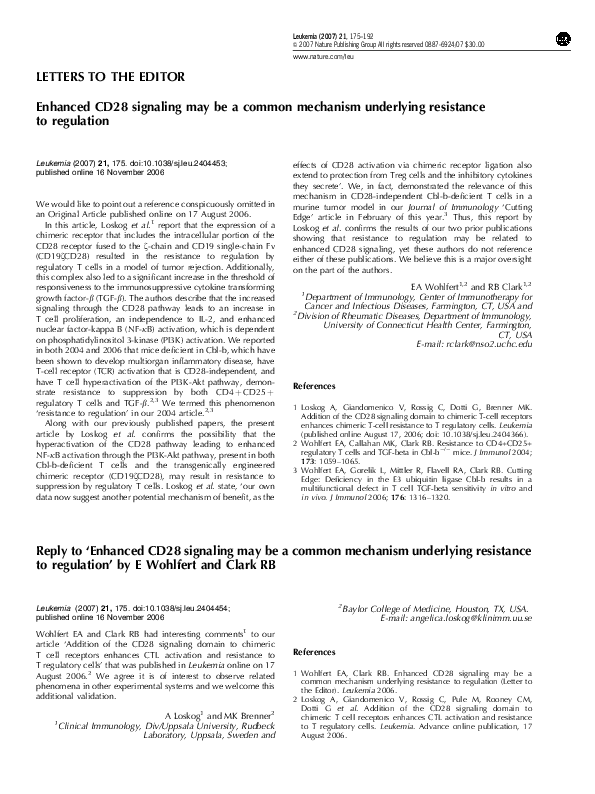Leukemia (2007) 21, 175–192
& 2007 Nature Publishing Group All rights reserved 0887-6924/07 $30.00
www.nature.com/leu
LETTERS TO THE EDITOR
Enhanced CD28 signaling may be a common mechanism underlying resistance
to regulation
Leukemia (2007) 21, 175. doi:10.1038/sj.leu.2404453;
published online 16 November 2006
We would like to point out a reference conspicuously omitted in
an Original Article published online on 17 August 2006.
In this article, Loskog et al.1 report that the expression of a
chimeric receptor that includes the intracellular portion of the
CD28 receptor fused to the z-chain and CD19 single-chain Fv
(CD19zCD28) resulted in the resistance to regulation by
regulatory T cells in a model of tumor rejection. Additionally,
this complex also led to a significant increase in the threshold of
responsiveness to the immunosuppressive cytokine transforming
growth factor-b (TGF-b). The authors describe that the increased
signaling through the CD28 pathway leads to an increase in
T cell proliferation, an independence to IL-2, and enhanced
nuclear factor-kappa B (NF-kB) activation, which is dependent
on phosphatidylinositol 3-kinase (PI3K) activation. We reported
in both 2004 and 2006 that mice deficient in Cbl-b, which have
been shown to develop multiorgan inflammatory disease, have
T-cell receptor (TCR) activation that is CD28-independent, and
have T cell hyperactivation of the PI3K-Akt pathway, demonstrate resistance to suppression by both CD4 þ CD25 þ
regulatory T cells and TGF-b.2,3 We termed this phenomenon
‘resistance to regulation’ in our 2004 article.2,3
Along with our previously published papers, the present
article by Loskog et al. confirms the possibility that the
hyperactivation of the CD28 pathway leading to enhanced
NF-kB activation through the PI3K-Akt pathway, present in both
Cbl-b-deficient T cells and the transgenically engineered
chimeric receptor (CD19zCD28), may result in resistance to
suppression by regulatory T cells. Loskog et al. state, ‘our own
data now suggest another potential mechanism of benefit, as the
effects of CD28 activation via chimeric receptor ligation also
extend to protection from Treg cells and the inhibitory cytokines
they secrete’. We, in fact, demonstrated the relevance of this
mechanism in CD28-independent Cbl-b-deficient T cells in a
murine tumor model in our Journal of Immunology ‘Cutting
Edge’ article in February of this year.3 Thus, this report by
Loskog et al. confirms the results of our two prior publications
showing that resistance to regulation may be related to
enhanced CD28 signaling, yet these authors do not reference
either of these publications. We believe this is a major oversight
on the part of the authors.
EA Wohlfert1,2 and RB Clark1,2
Department of Immunology, Center of Immunotherapy for
Cancer and Infectious Diseases, Farmington, CT, USA and
2
Division of Rheumatic Diseases, Department of Immunology,
University of Connecticut Health Center, Farmington,
CT, USA
E-mail: rclark@nso2.uchc.edu
1
References
1 Loskog A, Giandomenico V, Rossig C, Dotti G, Brenner MK.
Addition of the CD28 signaling domain to chimeric T-cell receptors
enhances chimeric T-cell resistance to T regulatory cells. Leukemia
(published online August 17, 2006; doi: 10.1038/sj.leu.2404366).
2 Wohlfert EA, Callahan MK, Clark RB. Resistance to CD4+CD25+
regulatory T cells and TGF-beta in Cbl-b�/� mice. J Immunol 2004;
173: 1059–1065.
3 Wohlfert EA, Gorelik L, Mittler R, Flavell RA, Clark RB. Cutting
Edge: Deficiency in the E3 ubiquitin ligase Cbl-b results in a
multifunctional defect in T cell TGF-beta sensitivity in vitro and
in vivo. J Immunol 2006; 176: 1316–1320.
Reply to ‘Enhanced CD28 signaling may be a common mechanism underlying resistance
to regulation’ by E Wohlfert and Clark RB
2
Baylor College of Medicine, Houston, TX, USA.
E-mail: angelica.loskog@klinimm.uu.se
Leukemia (2007) 21, 175. doi:10.1038/sj.leu.2404454;
published online 16 November 2006
Wohlfert EA and Clark RB had interesting comments1 to our
article ‘Addition of the CD28 signaling domain to chimeric
T cell receptors enhances CTL activation and resistance to
T regulatory cells’ that was published in Leukemia online on 17
August 2006.2 We agree it is of interest to observe related
phenomena in other experimental systems and we welcome this
additional validation.
A Loskog1 and MK Brenner2
Clinical Immunology, Div/Uppsala University, Rudbeck
Laboratory, Uppsala, Sweden and
1
References
1 Wohlfert EA, Clark RB. Enhanced CD28 signaling may be a
common mechanism underlying resistance to regulation (Letter to
the Editor). Leukemia 2006.
2 Loskog A, Giandomenico V, Rossig C, Pule M, Rooney CM,
Dotti G et al. Addition of the CD28 signaling domain to
chimeric T cell receptors enhances CTL activation and resistance
to T regulatory cells. Leukemia. Advance online publication, 17
August 2006.
�

 Robert Clark
Robert Clark